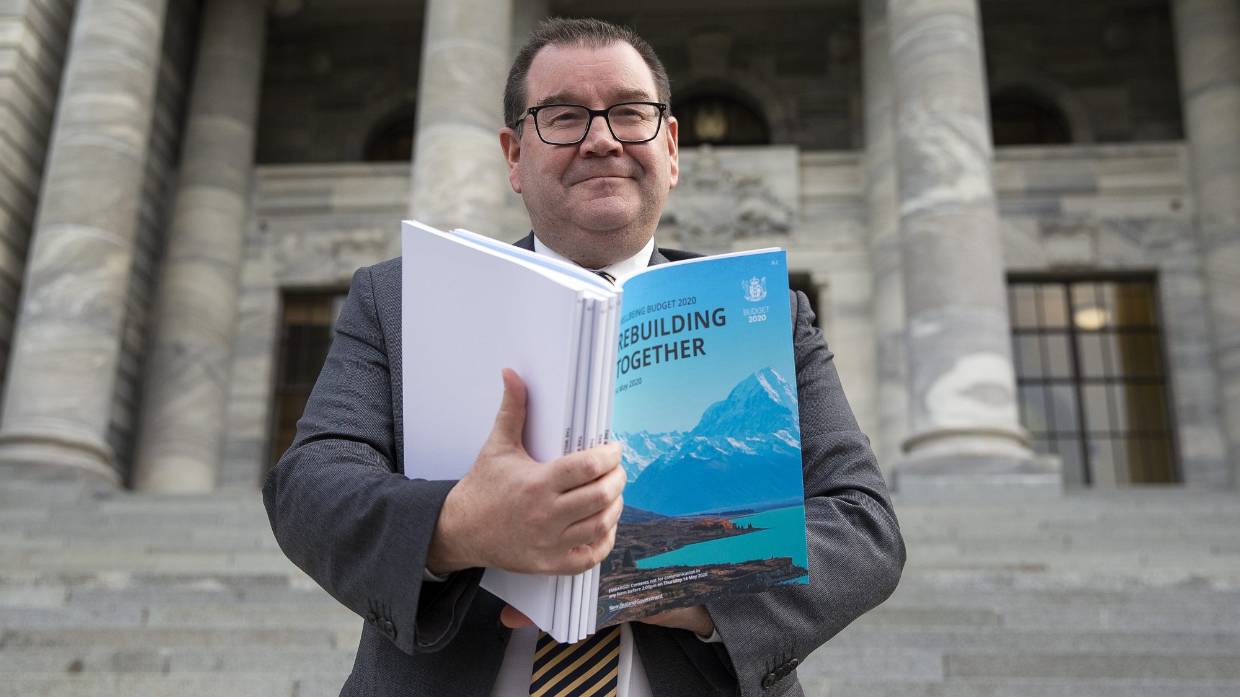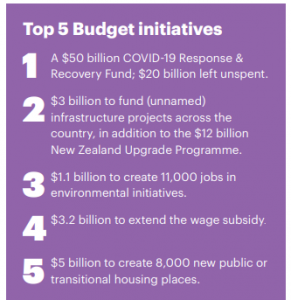Grant Robertson’s rainy-day Budget poured billions – with many more billions still to come – into saving and creating jobs report Dentons Kensington Swan partners Linda Clark and Hayden Wilson

 If the plan works (and it is still being developed to match rapidly changing economic circumstances) then New Zealand’s economy may be spared the worst of what the Prime Minister calls “dire global predictions”.
If the plan works (and it is still being developed to match rapidly changing economic circumstances) then New Zealand’s economy may be spared the worst of what the Prime Minister calls “dire global predictions”.
Since the decision to go into lockdown in late March, this budget has loomed as the Government’s most critical test. The pressure was immense, a fully formed pre-COVID budget had to be thrown out the window, and a budget for a vastly different world had to be delivered at speed and with so much uncertain.
It was essential, it had impact and, at first blush, the Finance Minister appears to have delivered. The signalling of a massive $50 billion response signposts the Government’s intent, but the decision to hold back a considerable amount of that spending in a ‘Recovery fund’ gives them room to manoeuvre.
The targeted extension of the wage subsidy scheme will be welcomed by businesses hit hard by the lockdown. It remains to be seen whether that further $3 billion investment will be enough to blunt the oncoming spike in unemployment.
We would not rule out the possibility of further extensions depending on how quickly demand returns to the economy under Level 2.
More spending in infrastructure was expected, and $3 billion of it arrived, with an additional $1.2 billion going into rail investment, a favourite of New Zealand First.
More infrastructure spending will have a stimulus effect, including the promise to build 8,000 new state and social houses. Of course, with housing, the ‘can they build it’ question has to be asked.
The Greens will be happy with $1.1 billion in environmental jobs, targeted at the regions.
Most importantly, to our mind, is that that spending is structured across a range of smaller projects, rather than ‘big bang’ projects – decreasing the delivery risk and putting money into smaller communities.
But there is no escaping the scale of the oncoming economic and social shock that New Zealand is experiencing.
One budget figure alone tells the story. The Government will now spend $252.6m providing 200,000 school lunches to ensure New Zealand kids in low decile schools get at least one decent meal a day.
One commentator recently described Jacinda Ardern’s prime ministership as a tale of two leaders. In times of crisis, she wrote, Courageous Jacinda takes centre stage, acting boldly and drawing both domestic and international acclaim.
But, in normal times, it is Cautious Jacinda who is to the fore, stepping warily and advancing slowly.
Over the term of this government, Grant Robertson has displayed a similar duality. On the one hand, the Finance Minister who, when introducing New Zealand’s first “Wellbeing Budget” in 2019, talked of being part of “a Government that is not satisfied with the status quo”.
On the other, the Finance Minister who two years earlier had signed up to a set of Budget Responsibility Rules that included pledges to deliver sustainable operating surpluses and to restrict the ratio of public debt to GDP, thereby restricting the scope for social spending.
So while, to quote Robertson, the “one-in-100- years shock to our society and economy” that is COVID-19 meant “this year’s Budget will be far from business as usual”, just how unusual it would be was open to question.
It seemed reasonable to assume Robertson’s response would be pragmatic, not radical: that he would use the existing levers at his disposal to drive his recovery plans, rather than overhaul the whole mechanism to meet the challenges ahead. And that is exactly what he has done.
Winners
It’s hard to see too many winners in the conventional sense of the word. As Prime Minister Jacinda Ardern said to Parliament after the presentation “nothing about this time in our history is usual and that includes the way to mark and measure the programme outlined today”.
Certainly, businesses looking for relief from the terms of their leases, or for something to prop up their non-existent cashflow, will not see themselves as winners – yet they will receive more than $3 billion from the extension of the wage subsidy scheme.
Tourism operators facing zero revenue and an uncertain future will likely see the $400 million targeted tourism recovery fund and associated domestic tourism campaign as falling well short of what their industry needs – despite it being well up on the $111 million spent on marketing the country to overseas tourists last year and the $64 million the Provincial Growth Fund spent on tourism attractions and infrastructure.
They will have to hope that Robertson’s indications of future support materialise, and soon, and that the promised marketing campaign really catches fire. The one-in-four children likely to benefit from the $220 million that will be spent on the free school lunch programme may well not see themselves as winners either – particularly given benefit levels are to remain unchanged. Coalition politics plays a big (and some have argued a disproportionate) part in how far and in which direction this Government moves.
The support given to Winston Peters’ pet projects (the postal service, the railways, and the racing industry); the prioritisation of shovel-ready infrastructure projects and a programme to build 8,000 state houses; and a $1.77 billion boost in defence spending make the New Zealand First leader and his lieutenants, Shane Jones and Ron Mark today’s winners.
Losers
And if New Zealand First are grinners, the Greens will be less pleased. While there is an additional $1.1 billion for environmental initiatives, and nearly $3 billion on rail, most of it will not be spent by Green Party ministers.
There appears to be no new money for environment-friendly start-ups or climate change initiatives: responding to this generation’s “nuclear-free moment” (Ardern’s description of the challenge posed by climate change) is apparently on ice.
Robertson name-checked the Greens once in his speech (as he did his National Party predecessor, Bill English) and its co-leaders, James Shaw and Marama Davidson, made no announcements.
This seems to confirm the adage “it is hard to be green when you are in the red”. Some things haven’t changed, even after COVID.
The other big losers are the next generations. Gen X and Millennials are the citizens who will have to pay back the rapidly rising debt the country is about to incur – and they may well not be able to finance it at the current, basement-level interest rates.
Meanwhile, their elders receive returns on their savings and the tax system remains unaltered. Time will tell, but the economic pain caused by COVID-19 may well outlast the virus itself.
Also-rans in the loser category include animal pests – especially ones imported from Australia – and wilding pines.
Jobs
“This budget is about jobs,” said finance minister Grant Robertson near the top of his big speech in Parliament.
The outlook is bleak – a projected rise in unemployment to nearly 10 percent next month, and the prospect of it taking at least another two years before this reduced to the pre-COVID figure of just over four percent.
“The economy could start growing again in the year beginning 1 July 2020”, asserted Robertson’s main statement.
Let’s all hope so
The wage subsidy scheme will be extended, in a “targeted” way. In addition to the $10 billion already spent – far and away the largest single element of the government’s pandemic response – a further $3.2 billion has been allocated, covering a 12-week period that starts on 10 June.
This money is aimed at firms that have suffered, or expect to suffer, revenue loss of at least 50 percent for the 30 days before the application date versus the nearest comparable period last year.
Grant Robertson also told us that the jobs budget spelled bad news for animal and plant pests across Zealand. He announced $1.1 billion spending aimed at creating “almost 11,000 jobs in regional New Zealand to restore our environment.”
These jobs would be in animal pest eradication, control of wilding pines, restoration of wetlands and waterways and efforts by the Department of Conservation to “work with councils, iwi and local businesses such as tourism operators to provide nature-based jobs.”
If New Zealand is inundated with animal and plant pests, by contrast our tourists have all but disappeared. The other major plank of the Budget’s jobs drive was the announcement of a $400 million “targeted Tourism Recovery Fund.”
This money would go towards a “domestic tourism campaign”, to help resuscitate a sector ruined by the ending of in-bound travel. Detail is lacking for now, and some of the initiatives that were announced this afternoon look somewhat bureaucratic in nature.
The new “Tourism Recovery Ministers Group”: another committee? Then there is the creation of a “Strategic Tourism Assets Programme”, which will identify “strategic” attractions and amenities “and provide them with the protection and assistance they need.”
Infrastructure
Significant investment in the rail and ferry network and a major new public housing initiative were the stand-outs as far as new infrastructure projects go.
However, infrastructure was present in spirit at least in a number of other announcements too, in particular the $1.6 billion for trades training, the support for employers training apprentices, and the extension of the fees free policy to help workers retrain.
Beyond that, the policies and objectives set out when the Government announced the New Zealand Upgrade earlier this year remain in place.
A significant casualty is the $6 billion Light Rail project being paused with no timeframe for returning it to cabinet – code for the end of Light Rail in Auckland.
In various ways, the Budget announcements confirmed the enhanced powers that a small group of ministers will have in shaping New Zealand’s economic destiny, for good or for ill.
Expect a small number of committees, attended by a small number of ministers, to have an out-sized influence from now on, as an enduring legacy of the pandemic response.
As one of today’s key announcements pointed out, “Ministers will soon decide which projects to progress and consider advice from the Infrastructure Industry Reference Group (IRG) which has received a total of 1924 submissions across approximately 40 sectors with a combined value of $136 billion.” And you thought ministers Jones, Robertson and Parker already held a lot of sway.
Health
It’s another sign of the times that large increases in health spending were not the centrepiece of today’s Budget announcements. “Health” could not compete with the mantra of “jobs, jobs and jobs.”
And yet… Let’s remember the health-focused announcements that were made by the extremely visible and influential Grant Robertson and his less visible and considerably less influential colleague, Health Minister David Clark on 12 May.
The most important of these was a $3.9 billion funding boost to the nation’s district health boards (DHBs). There was also a one-off boost of $282 million for a catch-up on elective surgeries.
According to the ministers’ joint release, “Budget 2020 delivers the biggest ever increase in funding for District Health Boards, as well as additional funding to deliver approximately 153,000 more surgeries and procedures, radiology scans and specialist appointments to help clear the COVID-19 backlog.”
Two days earlier, the health minister announced an increase of $160 million over four years in the Combined Pharmaceutical Budget, which is managed by PHARMAC and covers DHB purchasing of medicines, vaccines, medical devices and other treatments.
Close observers of the sector noted that, given Pharmac’s c.$1 billion annual budget, such an increase over a period of four years was less than impressive. Enough to garner a few headlines on a sleepy Level 3 Sunday, but not much more than that.
Of course, health and the economy are closely intertwined. The recession now seizing the New Zealand economy will, if prolonged and deep enough, bequeath a legacy of mental health and other serious afflictions for many of our citizens.
Today’s “jobs, jobs, jobs” mantra therefore has a health as well as an economic dimension.
The politics of the Budget
And summing it all up The Budget marks Labour’s opening salvo in the COVID-19 2020 election campaign. Like this year’s budget, this year’s election will be unlike any other, with Recovering and Rebuilding, for better or for worse, set to dominate all other considerations.
Labour has been unwavering in its desire to keep the election date the 19th of September. There is likely to be a halo effect for Labour from its handling of the health response to COVID-19; however, as New Zealand moves from a potential health crisis to an actual economic crisis (for many, at least) that halo is likely to slip.
Labour has stayed true to its core values, with significant funding for health, social housing and education. Robertson even referenced Peter Fraser (to emulate) and the 1980s economic reforms (to avoid) as sources of inspiration.
The unspent $20 billion sitting in the Recovery and Rebuild fund is a huge war chest. Over the coming months, Labour will be able to announce significant spending promises to assist key sectors in the economic recovery.
If it plays its cards right it will have aces to trump National as the campaign comes to a close.
Simon Bridges response to Robertson’s Budget speech started as one of consolation; his criticism in sorrow more than anger.
Bridges commended the Government for its hard and fast health response, while lamenting its “soft and slow” economic response.
Bridges well-worn line about flattening the curve but not the economy was also used several times.
Bridges speech sketched out what are likely to be the key themes of National’s election campaign. Labour will increase taxes; its shotgun spending will be ineffective; and National has an established track record of recovering from crises.
Central to Bridges’ response was how much money the Government is borrowing and how it will saddle future generations with debt they will have to pay back.
National is raising the possibility of considerable tax increases under Labour – a message that worked well for National in the 2017 campaign and one they will clearly be using again.
National’s response had already been well signalled: Labour’s approach to spending money and central control of how that money is spent is inefficient and will see businesses go under and jobs lost.
Under what are the most trying conditions to prepare a budget in living memory, Labour has pulled together a coherent plan. It has some wiggle room, with a lack of specific initiatives and a large pool of cash (or slush fund) in reserve.
It has however drastically altered New Zealand’s fiscal position. Robertson has said Labour will recover that position: National will question their ability to deliver on that promise.
The Budget announcement, and the response from Bridges and others, shows the rhetoric and reality that will shape the coming election campaign.
An extraordinary year to date, shaped overwhelmingly by the economic and health ravages of a microscopic virus, is set to remain extraordinary.
Linda Clark and Hayden Wilson are partners in Dentons
Linda Clark +64 4 498 0862, +64 27 490 7942 [email protected]
Hayden Wilson +64 4 915 0782, +64 21 342 947 [email protected]




